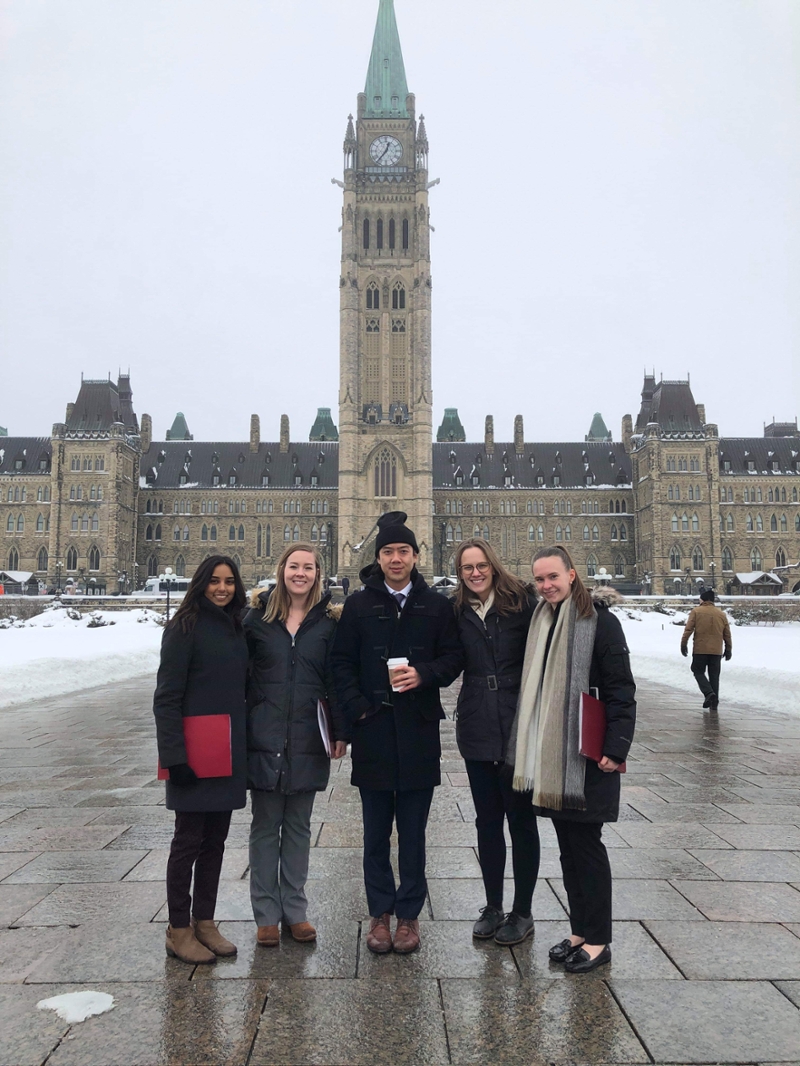
Day of Action for Seniors Care and Aging: Behind the Scenes (Part 2)
On Feb. 4, medical students from across Canada gathered in Ottawa to lobby the government for a coordinated response and plan to seniors care and aging during the Canadian Federation of Medical Students Day of Action.
By Jessica FroehlichFive University of Saskatchewan delegates, including myself, were present to meet with MPs and Ministers throughout the day and discuss the important issues at hand.
After taking months to investigate the topic and contact community stakeholders with the Day of Action research committee, I had the opportunity to present our findings to over 65 medical student delegates in Ottawa in preparation for our meetings with Parliamentarians. It was a riveting experience.
The next day, we showed up to Parliament Hill in our best suits to discuss concrete actions for improving healthy aging and aging with dignity in Canada. These included:
- Commit to targeted funding and development of a National Seniors Strategy for the 2019 federal election.
- Commit to the development of a national evidence-based formulary as a first step towards designing and implementing a truly universal, comprehensive, and cost-effective National Pharmacare Program that provides access to drugs for all Canadians. Work in collaboration with national experts to promote targeted deprescribing to minimize polypharmacy.
- Support national leadership on developing and tracking quality indicators, to enhance the quality of and access to home care, palliative care, and community care provided in the provinces/territories, at the next Federal/Provincial/Territorial Ministers Responsible for Seniors Forum.
This experience was a bouncing off point to learn about seniors care in my own communities and reflecting on how I can use my skills and knowledge to add to the work that is already being done. I became more aware of the language used regarding aging and why it is important. Language that is sometimes associated with an aging population includes a burden, a crisis, and a growing problem. But our seniors have so much to offer their communities, including life lessons and wisdom.
We need to work at understanding aging as something valuable for a community and its members. Language carries and conveys meaning that can lead to judgments, stereotypes, and discrimination, so taking the time to discuss this topic is a chance for us to evaluate our own misconceptions and biases, and work towards building a society that celebrates aging instead of dreads it.
I learned that sometimes, with the way that policy and bureaucracy work, the odds aren't always in your favor. However, as medical students there is so much that we can do in our daily lives for seniors care and aging, or other topics close to our hearts.
As important as political advocacy is, meeting with policy makers is not the only way to effect social change. This was made extremely clear by the incredible work of community leaders who were contacted throughout the research and consultation process.
Change does not happen in one single day. However, I hope that by lending our voices to the hard work and advocacy of those who are dedicating their lives to this topic, we can add more fuel to their fire and uplift their calls regarding this topic.
